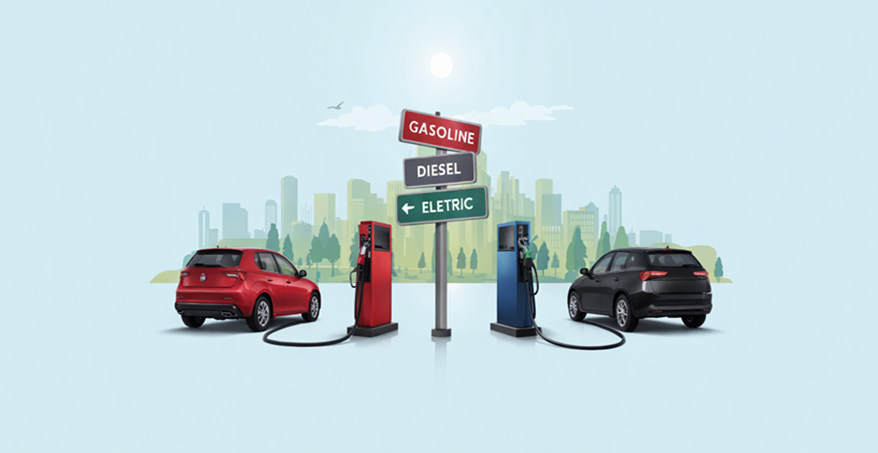As automotive enthusiasts, we’re constantly faced with exciting new choices. Yet, one question remains crucial for every car owner: which fuel type offers the best efficiency and savings?
Today, we explore the ultimate showdown between gasoline, diesel, and electric vehicles (EVs).
Buckle up and let’s dive deep into these fuel efficiency contenders!
Gasoline Vehicles – Traditional Convenience
Gasoline vehicles have been the backbone of American mobility for over a century. They dominate the market due to their affordability, extensive refueling network, and simplicity. Models like the ever-popular Honda Accord (around $27,295 – $39,440) and the timeless Toyota Camry ($27,515 – $37,940) have captured hearts and driveways across the country.
Fuel Efficiency
On average, gasoline-powered cars offer between 25 to 35 miles per gallon (mpg), depending heavily on driving habits and vehicle size. Smaller sedans such as the Hyundai Elantra ($22,065 – $28,065) regularly achieve higher ratings (approximately 37 mpg combined), making them attractive options for daily commuters.
Pros and Cons
-
Pros: Lower upfront cost, ease of refueling, wide vehicle choice.
-
Cons: Fluctuating fuel prices, environmental concerns, moderate fuel economy.
Diesel Vehicles – Powerful Efficiency
Diesel engines offer a compelling alternative, combining robust performance and greater fuel efficiency, especially popular in trucks and SUVs. Vehicles like the Chevrolet Silverado 1500 Duramax Diesel ($48,895 – $65,995) or the practical and powerful Jeep Wrangler EcoDiesel ($41,690 – $66,995) impress with robust torque and admirable efficiency.
Fuel Efficiency
Diesel vehicles typically boast 20–30% greater fuel efficiency than gasoline engines, averaging 30–45 mpg on highways. For example, the Chevrolet Silverado Diesel achieves approximately 27 mpg combined—impressive for a full-size truck.
Pros and Cons
-
Pros: Higher torque for towing, better highway fuel economy, longer engine lifespan.
-
Cons: Slightly higher upfront cost, potentially higher maintenance costs, fewer fuel station options in some regions.
Electric Vehicles – Eco-Friendly Revolution
Electric vehicles (EVs) are rapidly transforming the automotive industry, promising extraordinary fuel efficiency, minimal environmental impact, and innovative technology. The Tesla Model 3 ($38,990 – $53,990) and the Ford Mustang Mach-E ($43,995 – $65,995) stand out as prime examples of sophisticated EV technology gaining popularity across America.
Fuel Efficiency (MPGe)
EVs offer efficiency measured in miles-per-gallon equivalent (MPGe), representing energy use compared to traditional gasoline. Many popular EV models achieve impressive efficiencies between 90 to 130 MPGe. For instance, the Tesla Model 3 Standard Range Plus boasts approximately 132 MPGe, making electric vehicles undeniably cost-effective regarding fuel use.
Charging Costs & Infrastructure
EV charging infrastructure continues to rapidly expand, particularly in urban and suburban regions, reducing concerns about charging accessibility. Home charging offers significant cost savings, with average electricity costs significantly lower than gasoline or diesel per mile traveled.
Pros and Cons
-
Pros: Exceptional efficiency, low fuel (charging) cost, minimal emissions, potential tax incentives.
-
Cons: Higher initial cost, charging station dependency, limited driving range compared to conventional vehicles (typically 200–350 miles per charge).
Cost Analysis – Long-Term Savings?
Considering fuel and maintenance costs, EVs usually deliver superior long-term savings. According to Consumer Reports, the average EV owner saves around $6,000 to $10,000 over the vehicle’s lifetime compared to gasoline vehicles. Diesel engines, while more fuel-efficient than gasoline, often have higher maintenance costs but excel in scenarios involving towing and frequent long-distance highway travel.
Here’s a simplified comparison:
-
Gasoline vehicles: Lower initial cost, moderate fuel costs, medium-long term expenses.
-
Diesel vehicles: Moderate initial cost, lower fuel costs for highway driving, higher maintenance over time.
-
Electric vehicles: Highest initial cost, extremely low fuel (electricity) and maintenance costs, high long-term savings.
Environmental Impact – Choosing Sustainability
Environmental considerations are increasingly influencing buyer decisions. Gasoline and diesel vehicles emit significant greenhouse gases, contributing to pollution. Electric vehicles dramatically reduce direct emissions, making them environmentally preferable, especially when powered by renewable energy sources.
If sustainability aligns with your lifestyle, EVs stand out as the superior choice.
Which Vehicle Type Should You Choose?
Ultimately, your choice depends heavily on your driving habits, budget, and personal priorities.
-
Frequent highway driving and towing? Diesel vehicles offer compelling efficiency.
-
Budget-conscious commuter? Gasoline-powered compact sedans provide attractive affordability.
-
Environmentally conscious, seeking long-term savings and cutting-edge tech? Electric vehicles offer unparalleled efficiency and sustainability.
By carefully assessing fuel efficiency, operating costs, and environmental factors, you can confidently select the vehicle that matches your lifestyle, budget, and values. Each option—gasoline, diesel, and electric—holds distinct advantages. Embrace the excitement of automotive evolution, knowing your choice reflects informed passion, smart budgeting, and conscious living.


